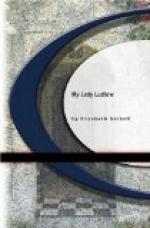Lady Ludlow was proud of her personal superintendence of her own estate. She liked to tell us how her father used to take her with him in his rides, and bid her observe this and that, and on no account to allow such and such things to be done. But I have heard that the first time she told all this to Captain James, he told her point-blank that he had heard from Mr. Smithson that the farms were much neglected and the rents sadly behind-hand, and that he meant to set to in good earnest and study agriculture, and see how he could remedy the state of things. My lady would, I am sure, be greatly surprised, but what could she do? Here was the very man she had chosen herself, setting to with all his energy to conquer the defect of ignorance, which was all that those who had presumed to offer her ladyship advice had ever had to say against him. Captain James read Arthur Young’s “Tours” in all his spare time, as long as he was an invalid; and shook his head at my lady’s accounts as to how the land had been cropped or left fallow from time immemorial. Then he set to, and tried too many new experiments at once. My lady looked on in dignified silence; but all the farmers and tenants were in an uproar, and prophesied a hundred failures. Perhaps fifty did occur; they were only half as many as Lady Ludlow had feared; but they were twice as many, four, eight times as many as the captain had anticipated. His openly-expressed disappointment made him popular again. The rough country people could not have understood silent and dignified regret at the failure of his plans, but they sympathized with a man who swore at his ill success—sympathized, even while they chuckled over his discomfiture. Mr. Brooke, the retired tradesman, did not cease blaming him for not succeeding, and for swearing. “But what could you expect from a sailor?” Mr. Brooke asked, even in my lady’s hearing; though he might have known Captain James was my lady’s own personal choice, from the old friendship Mr. Urian had always shown for him. I think it was this speech of the Birmingham baker’s that made my lady determine to stand by Captain James, and encourage him to try again. For she would not allow that her choice had been an unwise one, at the bidding (as it were) of a dissenting tradesman; the only person in the neighbourhood, too, who had flaunted about in coloured clothes, when all the world was in mourning for my lady’s only son.
Captain James would have thrown the agency up at once, if my lady had not felt herself bound to justify the wisdom of her choice, by urging him to stay. He was much touched by her confidence in him, and swore a great oath, that the next year he would make the land such as it had never been before for produce. It was not my lady’s way to repeat anything she had heard, especially to another person’s disadvantage. So I don’t think she ever told Captain James of Mr. Brooke’s speech about a sailor’s being likely to mismanage the property;




